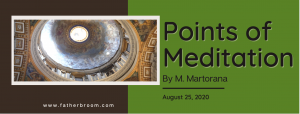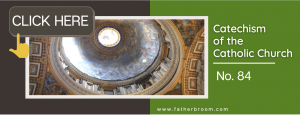
“For greater things you were born.” (Ven. Mother Luisita)
TUESDAY, AUGUST 25th Mt. 23:23-26 “Woe to you, scribes and Pharisees, you hypocrites. You cleanse the outside of cup and dish, but inside they are full of plunder and self-indulgence.”
Jesus is unmasking the hypocrisy and pride of the scribes and Pharisees.
Catholic theologian Garrigou-Lagrange, O.P. (+1964) warns us of the dangers of pride.
“It gives us such confidence in our reason and judgment that we are not very willing to consult others, especially our superiors, or to enlighten ourselves by the attentive and benevolent examination of reasons or facts which may be urged against us. It leads also to asperity in discussions, to stubbornness in judgment, to disparagement which excludes in a cutting tone all that does not fit in with our manner of seeing things. This state of mind leads to manifest imprudent acts that will have to be painfully expiated.”
Garrigou-Lagrange contrasts growth in our natural life with growth in our spiritual life.
In our natural life, maturing means leaving the embrace of mother and father and moving from dependence on our parents to independence and autonomy.
Growth in the spiritual life is a contrary movement… In our spiritual life, maturing means moving from a false autonomy of self-sufficiency to throwing ourselves into the arms of our Heavenly Father and Holy Mother Church (Mater Ecclesia), embracing our total dependence on God by means of obedience to the commandments and the teachings of our Holy Church, under the leadership of our Holy Father and the guidance of the Holy Spirit. (cf Jn. 14:16-17, 26)
“For God so loved the world that he gave his only begotten Son, that whoever believes in him shall not perish but have eternal life.” (Jn 3:16) How intimately and tenderly God loves us: with a love that is defenseless and inexhaustible, a love that shows us mercy and forgiveness while we are yet sinners, a love that gives us a sure path to heaven through the commandments and the teachings of His Holy Church guided by the Holy Spirit!
For this reason, Jesus says: “Truly I tell you, unless you change and become like little children, you will never enter the kingdom of heaven.” (Mt. 18:3)
LESSONS FROM THE CHILD JESUS: GOD’S WISDOM! By Fr. Ed Broom, OMV
Jesus stated it very clearly: “Unless you become like a child you cannot enter into the Kingdom of Heaven.” (Mt. 18:3) Also, on one occasion, the Apostles were trying to prevent the children from coming to Jesus, the Lord said forcefully: “Let the children come to me; if you do not become like a little child you cannot enter the Kingdom of God.” (Mt. 19:14)
OUR LADY OF FATIMA AND CHILDREN. One of the most famous, modern approved apparitions is that of Our Lady of Fatima. God sent His Mother from heaven to a little town in Portugal, Fatima, in the year 1917, six times from May 13 thru October 13. Who did Our Lady appear to? The brilliant? The scholars? The rich and important? The flashy and ostentatious? To none of these did Our Lady appear. Rather, she appeared to three little children—tenders of sheep, and with no formal education! God’s ways are not our ways—this is certain!
GOD’S PROVIDENTIAL DESIGN. God could have chosen any one of limitless possibilities to ransom or save humanity after the sin of our first parents, Adam and Eve, that we call Original Sin. God could have come as a powerful King, or a rich millionaire, or a brilliant genius, or a plethora of other flashy, fantastic ways! But no! God’s ways are as different from our ways as the heavens are above the earth! In His Providential Design, God willed to save the world by what theologians call The Incarnation—meaning? That God willed to become one of us, to become a man like all of us with one exception—He was born without sin, lived a sinless life, and died on the cross to save us from our sins!
AS A CHILD. Furthermore, God willed to enter the world by the same means by which we entered the world—through a woman. God chose Mary to be the channel by which He would enter humanity. The Ever Virgin Mary conceived Jesus through the power of the Holy Spirit and maintained her virginity even in the moment of giving birth to Jesus. Indeed, she was ever virgin before, during, and after the birth of Christ.
JESUS THE CHILD—THE SON OF GOD. Jesus was the baby born of Mary. This Virgin Mother took Him in her tender arms, wrapped Him in swaddling clothes, and nestled Him close to her most pure and Immaculate Heart. Then Mary placed Jesus on the hay in the manger. The word manger comes from French and means to eat! It was the feeding trough of the animals. Later on, as a man, Jesus would challenge people to nourish themselves on His Body and Blood if they wanted to live, and live forever. “I am the Bread of life. Whoever eats my Body and drinks my Blood will have everlasting life and I will raise Him up on the last day.” (Jn. 6: 22-71—Bread of life discourse).
BETHLEHEM: HOUSE OF BREAD. There are no coincidences or unplanned circumstances in God’s providential designs. The word Bethlehem actually means House of Bread. No surprise that Jesus, who was born in the city of the House of Bread, would declare Himself the Bread of life and challenge us that our eternal salvation hinges upon our consuming Him in Mass and Holy Communion as the Bread of Life.
IMPORTANT LESSONS FOR US FROM THE CHILD JESUS.
There are many lessons to learn from God becoming man, being in the womb of Mary for nine months, and finally being born as a little Baby. Let us dig deep into this goldmine of wealth and derive abundant treasures for our meditation and imitation, transformation and sanctification, and perseverance! What then are the lessons of the Infant-Child Jesus?
1. DEPENDENCY. Even though the Baby Jesus was God, the Son of God made man, still He made Himself totally dependent on others, most especially Mary and Saint Joseph. Jesus would live this attitude of dependency on His Heavenly Father during the whole course of His life. In our spiritual lives we must develop and cultivate a child-like dependency on God in all times, places, and circumstances. In the Sermon on the Mount Jesus challenges us to trust by contemplating nature—the lilies of the field who neither labor nor spin and the birds of the air who neither sow nor reap…yet our Heavenly Father provides for them. (Mt 6:25-34). In contrast, in His Public life, Jesus had no permanent home, saying: The foxes have their holes and the birds of the air their nests, but the Son of man has nowhere to rest His head. (Lk. 9:58)
2. HUMILITY. The littleness of the Child-Jesus is an extraordinary example of humility. God loves the humble but casts down the mighty from their thrones. (Mary’s Magnificat Lk. 1:52) He chose the Publican over the Pharisee, humility over an overweening pride. (Lk. 18:9-14) As a man, Jesus described His own Sacred Heart using two descriptions: “I am meek and humble of heart.” (Mt. 11:29) Arrogance, conceit, haughtiness, and self-importance are all alien to the person of the child, and most especially the Child-Jesus! May He inspire us to pursue a life of great humility!
3. POVERTY. Once again, even though Jesus was, is, and always will be God, the Second Person of the Blessed Trinity, He chose to enter the portals of this world not in a palace, castle, or an opulent mansion. On the contrary, He entered this world being born in a stable that served as a refuge for animals. A good part of the warmth of that little cave was the heat from and the breath of the animals there present! We must learn that pursuing money, possessions, power, and esteem will not fill us with authentic joy. Pleasure, yes, but true joy never! The Child Jesus, born in Bethlehem teaches us that we will find true happiness not in the created world, but in the Creator of the world—Jesus the Lord. Ven. Archbishop Fulton Sheen penned it so eloquently: The Creator of the universe had no place to be born in His own creation!
4. INNOCENCE. In a world where innocence is being lost, even among the children, due to an uncontrolled use of modern technology, the Infant Jesus teaches us clearly and unequivocally the importance of striving to live lives of innocence—freedom from sin! Still more, the Innocent Child Jesus in the arms of Mother Mary challenges us to strive to protect the innocence of our children threatened by so many modern wolves!
5. CHILDLIKE SIMPLICITY: INSPIRING TRUST. In the overly complicated world that we have created, we should all long for a more simple, humble, frugal, transparent, as well as detached life-style. Models for us would be Saint Francis of Assisi, Mother Teresa of Calcutta, and the children of Fatima—Saints Jacinta and Francisco Marto, and their cousin Lucia De los Santos. By contemplating the Little Baby Jesus resting peacefully in the arms of His loving Mother, may we learn to strive for Evangelical Poverty and simplicity. Saint Ignatius of Loyola points out that nobody is afraid to approach an innocent little Baby – a strong, aggressive warrior, most-likely – but not an innocent little Baby.
May the Infant Baby Jesus resting in the loving and tender arms of His Mother Mary inspire us to greater trust, greater dependency on our Heavenly Father! Greater humility, greater simplicity, and a life of detachment from things, so that we can be totally anchored and rooted in God our Father!
Copyright 2020 Oblates of the Virgin Mary
St. Peter Chanel Church, Hawaiian Gardens, CA

